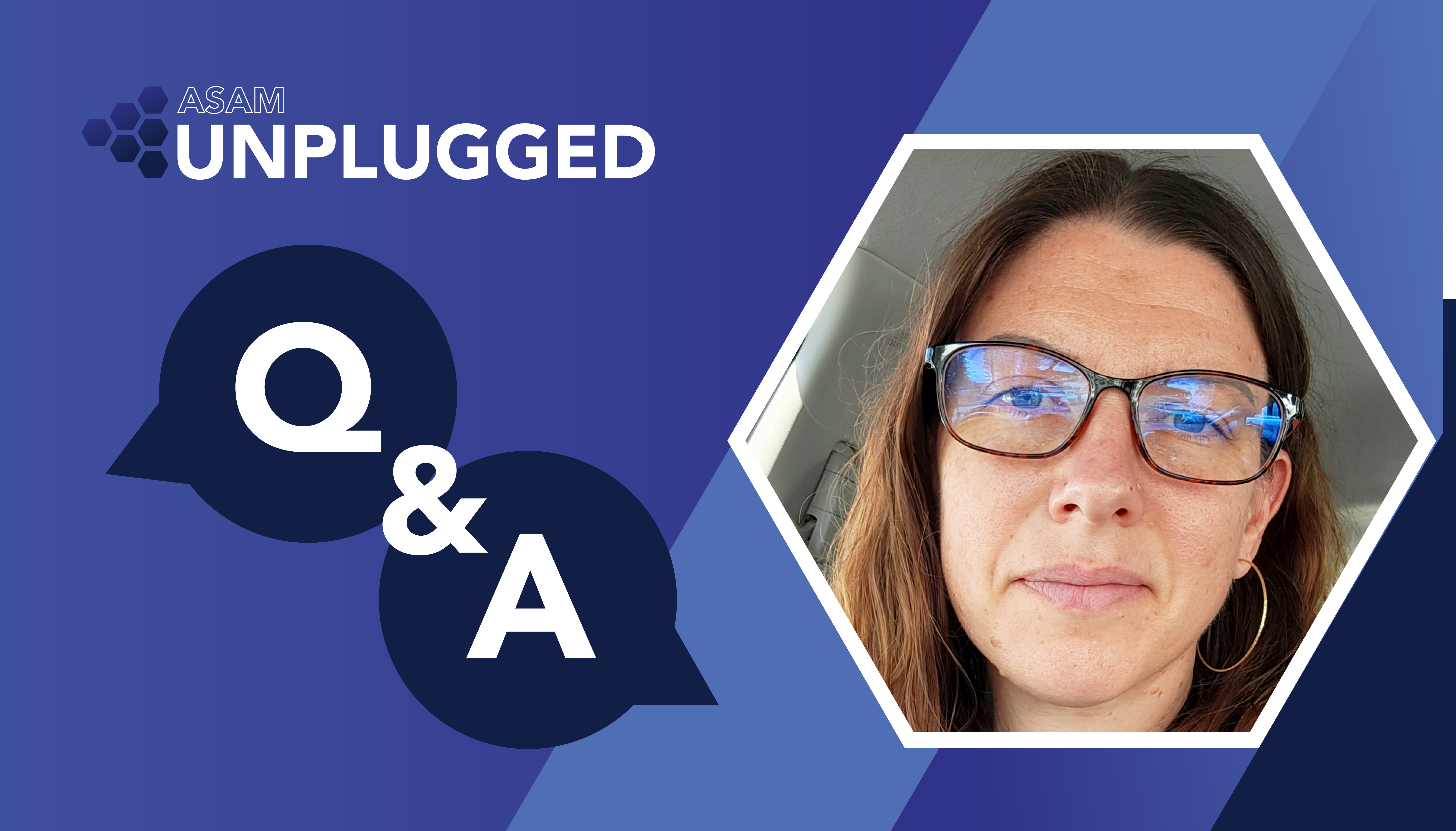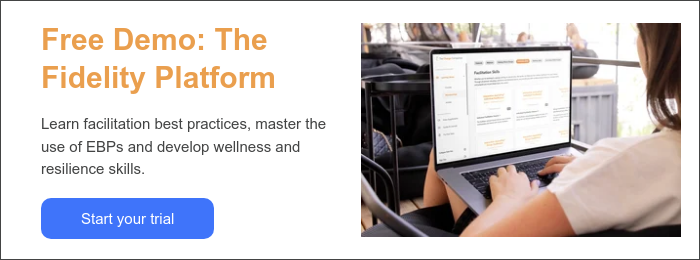ASAM Criteria Unplugged: A conversation with Amanda Luning

Gain unique access to behavior change leaders with our webcast series: ASAM Criteria Unplugged and Other Tales from the Field. Hear from leading experts in the field of substance use treatment, including Dr. David Mee-Lee, Dr. William R. Miller and many more.
Register here for our next ASAM Criteria Unplugged session, and watch past episodes on demand on the Fidelity Platform. Be the first to learn about upcoming webinars and open-registration events by signing up for our newsletter.
In Episode 4 of our ASAM Criteria Unplugged series, we had the pleasure of speaking with Amanda Luning, LMHC, IECMH-E. Amanda is the clinical director for the Salvation Army Family Treatment Services in the state of Hawai'i. Amanda was born and raised in Hawai'i into a very large family, and she's been working with young children and their families for over 20 years.
Amanda is a marriage and family therapist and a child-parent psychotherapist by training. She holds a license in mental health counseling, and her current public health doctoral work is in leadership, advocacy and equity. She is a longtime board member with the Association for Infant Mental Health in Hawai'i, and co-developed the Promising Minds Fellows Program.
Sitting down with The Change Companies Chief Program Officer Valerie Bagley and Train for Change Senior National Director Scott Boyles, Amanda shares her experience and insights on implementing culturally humble and trauma-sensitive care in programming.
Jump ahead to questions covered in this blog:
- Can you tell us more about the work you do as a clinical director, in terms of culturally humble, trauma-responsive programs?
- What are some considerations to keep in mind when approaching treatment?
- Do you have women in your in-patient programs who have children who do not enter treatment with them? If so, is the stay extended for the family?
- How do we learn about cultural diversity and humility?
- How do you use cultural humility in program design?
- What other thoughts do you have about working with cultural humility?
Q: Can you tell us more about the work you do as a clinical director, in terms of culturally humble, trauma-responsive programs?
Amanda Luning: "This is really exciting to get the opportunity to talk a little bit about Family Treatment Services. I don’t do anything — my team does everything. We are really like an incredible group of women, and it is a very... I’m going to almost get emotional. It’s a very fantastic team. We have people that are from all sorts of backgrounds — people that have lots of lived experience, people that are coming from really traditional Western educational backgrounds and then people that are coming from spaces where high school is not that important, but they’re most wise and lovely people, and they’re doing lots of great healing.
We have really a breadth of folks that are coming in and working with us, and we could not do that without the really incredible team that we have of really just dedicated people that recognize that this thing that we have here in front of us is complicated. It’s not just a result of drug use, and really, really about long-term health and healing of family systems and relationships. We go from residential. We have out-patient. We have housing. We have clean and sober houses that we run, and we have outreach and case management and care coordination, so we ideally can have our folks with us for a year and a half or two years."
Q: What are some considerations to keep in mind when approaching treatment?
Amanda Luning: "The way that we understand the approach to addiction recovery is really from a holistic standpoint that says, 'We recognize people are whole.' Their addiction is something that they are struggling with. If you’re using a disease model, it's a disease like diabetes. It is something that is a part of them and not who they are.
And we recognize, especially for women — and especially for women who are going to be parenting — we need to look at the entire system around them and the way in which they have come to know themselves, their values and the way in which they want to proceed with the next generation because they are coming in… pregnant or with their infants and their babies.
So it's a philosophical approach that says we recognize that folks are whole people. And we really spend a lot of time in curiosity and reflection and learning about those people, and we've been fortunate enough to … have long-term relationships, be in parallel process, be humble in the way that we approach these lovely human beings."
Q: Do you have women in your in-patient programs who have children who do not enter treatment with them? If so, is the stay extended for the family?
Amanda Luning: "We really encourage intergenerational, multigenerational Ohana style. So our resource caregivers — even if they are not related to the family — we really encourage long-term relationships. We have a certain set of [resource caregivers] in Hawai’i that are really wonderful — that really kind of hānai, as we say in Hawai’i. But [they] kind of informally adopt the whole mommy and the kiddos. We really, really encourage family style, where we have the folks that are taking care of the keiki to work directly with the mom.
And we have services that are put together. Those are ... mostly paid by SAMHSA and philanthropy to be able to have those side by side with the treatment programs. But we put it together so that they are all one treatment team.
In terms of the placement and the kiddos reunifying later on, in our clean and sober program, we do have the ability for them to bring up to three of their children up to 12 and 13 years old. We do have some little caveats on boys in puberty and in the houses with women and young children, but we do have them come together afterward in our clean and sober and therapeutic living program. And they can continue to work with the Ohana Center."
Q: How do we learn about cultural diversity and humility?
Amanda Luning: "We just are open to learning ... a big piece of cultural humility is just kind of acknowledging that the way that I think and the way that I understand how things work might not be the same as the way that this person thinks and the way that they understand that things work. And just maintaining your curiosity that says, 'Maybe I don't know.' And that's really kind of a stance and a standpoint and a way of being more than it is any particular piece of knowledge or any particular thing that you might know.
I think that we've kind of been led to believe that baselines are universal and that what we understand about certain things, everyone else should understand… Even common sense is going to be only understood by the way that you've come to understand it via your upbringing, your cultural understanding, your preferences, your biases, all those things.
So cultural humility just says, 'Maybe I don't know.' It's a way of staying in that place, and I think sometimes that's challenging as a professional when we're coming in with a particular way of assessing or we're coming in with a particular way of understanding what addiction is, what it looks like. We're using the ASAM [Criteria], for example, and we're assessing these different areas and we're understanding it from this standpoint.
I think that really asking, though, is a great way to be in that reverence space, is saying, 'This is the way that I understand what's going on with you from a history that I have or from an assessment I was given or from what you had to express previously. But can you tell me about how you understand that right now? Can you tell me about how you understand that from your family system or your family of origin? Can you tell me about what your family system, your cultural beliefs would do in this kind of situation?'
I think that just being curious, asking the question, and understanding that the way you understand it is not necessarily going to be the way that someone else does."
Q: How do you use cultural humility in program design?
Amanda Luning: "We are paying close attention to our feedback, to our surveys, to our client satisfaction, to all of those kinds of things. So we're really spending a lot of time getting information from the families that we work with. So we ask them.
We ask them, and we ask them, and we ask them, and we ask them, and we ask them. And so then we have a wonderful evaluator. We have folks that are really nerdy into data, and we look at patterns, and we look at qualitative measures, and we do those great things.
And then we evolve with what people are bringing us. And so again, we've had a really lovely longer-term relationship with some of our funders to be able to say, 'Okay, we're going to do this now. Okay, we're going to evolve and change this.'
… And that I know that that is really challenging for programs. I know that that's not always easy to do, to make it so that your billing matches, your coding matches, your documentation matches your actual service delivery, right? That is challenging. And so you do have to have folks that … pay attention to what your families need, and do that."
Q: What other thoughts do you have about working with cultural humility?
Amanda Luning: I think a lot of us who came into this work thought it was one thing.
And we are discovering, sort of as a collective of helpers — of service folks, of people who want to support health and healing for our communities and people — that we believe deserve care and love. We're finding that it's something else. And so be kind to yourself, because I think there's a lot of potential for professional grief and loss.
I think that there is a lot of potential for professional confusion and that feeling of incompetence. I always say that if you're smart and you give a bleep, then you're already on the right path. But take care of yourself, because these systems are big and these systems are old.
And they're coming from a lot of ways of being that we all assumed were the right way to be. And so a lot of us were trained in one way, a lot of us were developed to have a lot of education in one particular way. And so as you kind of turn things over in your head, or imagine how you might approach things differently, be kind to yourself. Be gracious with yourself, recognize that you have always been doing the best that you can with what you had and what you knew, and that you will just continue to do that as you learn new things.
And you imagine things differently. And that incremental change is the way to do it. And as much as we all want to burn it down, let's take it apart brick by brick and do that together as a collective. Get good support. Take care of each other.



